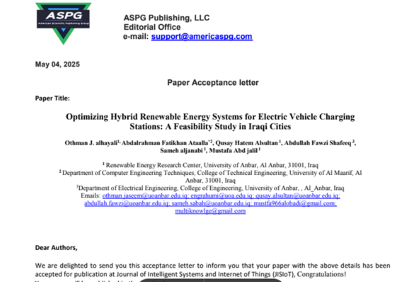|
Publication of a Scientific Research within Scopus Index
2025-05-05

Assistant Lecturer Othman Jassim Al-Hadithi, a lecturer at the Renewable Energy Research Center at Anbar University, published a scientific research paper with researchers from the Renewable Energy Research Center and the College of Engineering at Anbar University in the international journal "Journal of Intelligent Systems and Internet of Things," which is indexed in Scopus. The paper is titled:
"Optimizing Hybrid Renewable Energy Systems for Electric Vehicle Charging Stations: A Feasibility Study in Iraqi Cities"
Cite score: 1.7
ISSN: 2769-786X
The transition from conventional vehicles to electric vehicles represents a significant development in the field of sustainable transportation. To prevent concerns about battery drain, the use of electric vehicles requires the establishment of sufficient charging stations to recharge vehicle batteries. In Iraq, the infrastructure for electric vehicle charging stations remains limited, reducing the reliability and dependability of electric vehicles. This study evaluated the economic efficiency and feasibility of optimizing hybrid renewable energy (HRES) systems for electric vehicle charging systems in three Iraqi cities. This study aims to meet the growing demand for renewable energy due to concerns about fossil fuel depletion, environmental sustainability, and increasing conventional energy costs. The Hybrid Optimization Model for Multiple Energy Resources (HOMER) was used, taking into account weather data, load data, and equipment specifications. The results indicated that a system with a capacity of 300 kW of photovoltaic (PV), 100 kW of generators (GEN), and 78 units of batteries is the optimal system in the three cities, with the lowest cost of energy (COE) of approximately $0.025/kW. The renewable energy ratios in the optimized system in Mosul, Baghdad, and Basra are 53%, 52.7%, and 52.7%, respectively. This system achieves an annual energy production of 704,351 kWh from PV and 509,681 kWh from generators. This system maintains a high charge level in the battery bank, ensuring system stability and extending its lifespan. The system also efficiently meets load demands while reducing reliance on distributed generators (DGs). These results provide valuable insights into the deployment of high-power renewable energy systems (HRES) to achieve a more sustainable environment.
|